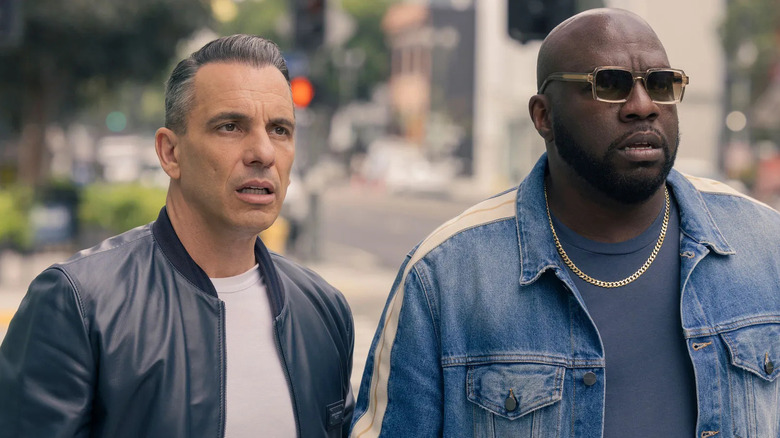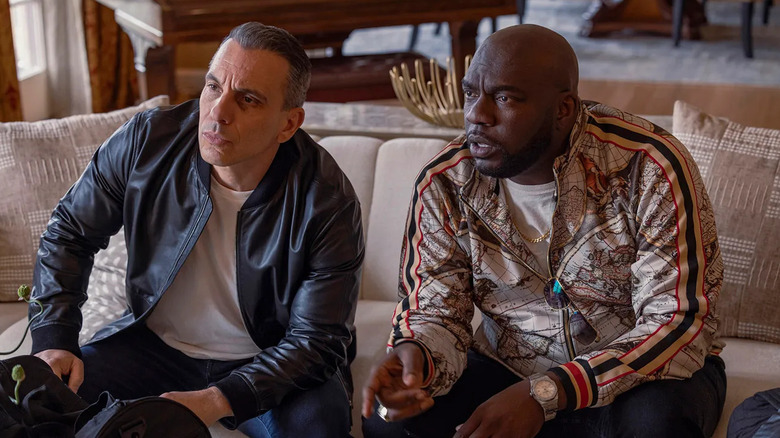HBO Max's Canceled Chuck Lorre Comedy Could Have Become A Classic
Out of all the short-lived Chuck Lorre TV shows that have been canceled rather early and abruptly after a few seasons (like the controversial-ish "United States of Al" or "B Positive"), the axing of HBO Max's "Bookie" hurts the most. Admittedly, it's more of a bummer if you're a long-time fan of the show's Italian-American lead, comedian Sebastian Maniscalco (his early stand-up specials are stone-cold bangers that deservedly made him a megastar in show business), but even if you're not, it's easy to tell that "Bookie" was different from your average Lorre sitcom.
First of all, it wasn't lukewarm broadcast television like most of his productions (which usually air on CBS), but a show specifically made for streaming (much like the TV veteran's "The Kominsky Method" on Netflix, which is far better than most of his other work post-"The Big Bang Theory"). That alone gave the half-hour comedy a distinct feel and allowed it to blossom in a playground with fewer limitations. The series needed that extended freedom due to its subject matter and shady characters, who were immersed in the chaotic, destructive, and brutal world of sports gambling. That meant "Bookie" was full of cursing, blackmail, physical violence, and broken families becoming casualties of this uncertain and addictive lifestyle.
Bookie had more potential than most Chuck Lorre shows
"Bookie" followed small-time veteran Los Angeles bookie Danny (Maniscalco) and his buddy Ray (Omar Dorsey), a washed-up football player and the muscle in the operation, as they struggled to survive the impending legalization of sports gambling in California, which would essentially render them obsolete. The duo's smooth chemistry was what the show truly relied on as it followed them on many long car rides to meet degenerate gamblers and various losers (including Charlie Sheen, fittingly playing cards in rehab) to get the money they're owed.
Though Maniscalco isn't necessarily multifaceted when it comes to his acting (his small role as a gangster in "The Irishman" was more silly than intimidating), portraying this old-school and arrogant guy fit him like a glove. In fact, he admittedly let his stage persona seep into Danny at times, which creators Lorre and Nick Bakay actually welcomed when they were short on jokes. In a 2024 interview with Variety, Bakay recalled, "He bailed us out. Sometimes we'll ask for it when we're in trouble. We'll be like, 'Hey buddy, we got nothing here!'"
Overall, however, "Bookie" was undoubtedly a team effort that worked thanks to its stellar cast (including Jorge Garcia, Vanessa Ferlito, Rob Corddry, and Andrea Anders in recurring roles), strong writing, and sensitive subject matter that's been largely ignored in other movies and TV shows. Of course, everything was slightly exaggerated and played for laughs (after all, it's a Chuck Lorre series), but in a way that felt naturally intriguing and hilarious at the same time. Yet, despite its good critical reception and appreciative viewership, HBO Max unceremoniously canceled "Bookie" after two seasons. Presumably, its ratings weren't strong enough to merit its continuation, but with so little promotion and marketing, it's not a surprise the show went largely under-seen and failed to land on more people's radar. If I weren't a huge Maniscalco fan, I wouldn't have known the series existed at all.
It's a shame because Lorre's projects have a tendency to grow in viewership (and sometimes quality) the longer they go on, but "Bookie" was denied that chance after only 16 episodes. I guess we'll never know whether it could've been another Lorre classic or not.

